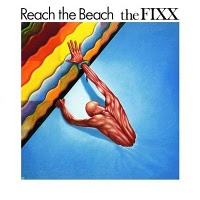 I remember seeing The Fixx on MTV when I was 13, there was always this dark sophistication surrounding them. Their sophomore album, Reach the Beach lives up to those first impressions. This record was quite a success for them with the hits “Saved by Zero”, a complex tune with a hopeless optimism that seems to clash with the melody & “One thing Leads to Another”, an almost dance track about deceit in relationships. The rest of the record follows suit with clean, chorus drenched guitar licks, snappy bass slaps, dissonant keyboards & those wonderful synthesized drums we all loved from the eighties. Cy Curnin’s vocals croon like The Cure’s Robert Smith trying to imitate Duran Duran’s Simon Le Bon, in fact, the music could be described in the same way, new wave funkiness with a sense of melancholy underneath it all- like trying to dance when your sad. Slightly cynical lyrics with upbeat, yet complex arrangements spare this record from being another eighties novelty, the contradictions keep it real. –ECM Tim
I remember seeing The Fixx on MTV when I was 13, there was always this dark sophistication surrounding them. Their sophomore album, Reach the Beach lives up to those first impressions. This record was quite a success for them with the hits “Saved by Zero”, a complex tune with a hopeless optimism that seems to clash with the melody & “One thing Leads to Another”, an almost dance track about deceit in relationships. The rest of the record follows suit with clean, chorus drenched guitar licks, snappy bass slaps, dissonant keyboards & those wonderful synthesized drums we all loved from the eighties. Cy Curnin’s vocals croon like The Cure’s Robert Smith trying to imitate Duran Duran’s Simon Le Bon, in fact, the music could be described in the same way, new wave funkiness with a sense of melancholy underneath it all- like trying to dance when your sad. Slightly cynical lyrics with upbeat, yet complex arrangements spare this record from being another eighties novelty, the contradictions keep it real. –ECM Tim
Rock
Repost: 10cc “Sheet Music” (1974)
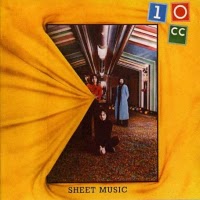 10cc’s “Sheet Music” may be one of my favorite pop albums of all time, lovingly crafted songs, witty, ironic and containing themes still highly relevant even today (“Clockwork Creep” is both funny yet scary when one consideres what the world has had to endure these last few years and “Hotel” nails American Imperialism down with wit and ingenuity), musically this album never fails to surprise taking in 70’s rock (Wall Street Shuffle, Silly Love, Oh Effendi), Calypso (Hotel), Latin Rock (Baron Samedi) and pure pop (The Worst Band In The World, Clockwork Creep), however the two standouts are the most cinematic pieces on the album, “Somewhere In Hollywood” brilliantly send up Hollywood and the star system, whilst “Old Wild Men” looks forward to 10cc’s eventual decline with heart and soul. –Derek
10cc’s “Sheet Music” may be one of my favorite pop albums of all time, lovingly crafted songs, witty, ironic and containing themes still highly relevant even today (“Clockwork Creep” is both funny yet scary when one consideres what the world has had to endure these last few years and “Hotel” nails American Imperialism down with wit and ingenuity), musically this album never fails to surprise taking in 70’s rock (Wall Street Shuffle, Silly Love, Oh Effendi), Calypso (Hotel), Latin Rock (Baron Samedi) and pure pop (The Worst Band In The World, Clockwork Creep), however the two standouts are the most cinematic pieces on the album, “Somewhere In Hollywood” brilliantly send up Hollywood and the star system, whilst “Old Wild Men” looks forward to 10cc’s eventual decline with heart and soul. –Derek
“Sheet Music” is a perennial Jive Time favorite and one of my top ten albums of all time. Fans of Sparks, late Move and early ELO will find things to love here. For those who only know 10cc from their hits; you may be pleasantly surprised when you hear “Sheet Music.” –David
Love “Da Capo” (1966)
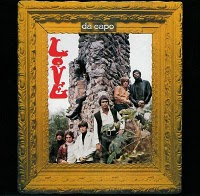 Inhabiting a strange dimension between the Byrds-meets-the-Rolling Stones bluster of their debut LP and the psychedelic mariachi sprawl of Forever Changes, Love’s Da Capo is a transitional album in every sense of the word. Taken together, the six songs that constitute its “Side A Suite” represent some of the best music of the ’60s, making it all the more painful that Side B represents one of its biggest let-downs. On the opening track, “Stephanie Knows Who”, Arthur Lee not only comes into his own, but also establishes himself as one of the most unique and expressive lead vocalists of his generation. There are probably Hallmark cards that are less maudlin and sappy than the MacLean-penned second track, “Orange Skies”, but somehow, miraculously, the band’s tight playing and Lee’s delivery elevate it to greatness. The loungey “¡Que Vida!” is a bit of fluff, but it swings like a Sunset Strip hipster. The mighty “Seven and Seven Is”, one of the few Love songs that ever charted, has been reproduced on garage compilations many times over, but hearing it here in its natural environment reveals what a massive artistic achievement it really is. Loud, fast, and intense, it could only end with the famous nuclear blast of its coda. Thankfully, respite is provided in the form of the acoustic and introspective gem, “The Castle”. Finally comes the mystical masterpiece, “She Comes in Colors”, a song so great that even the Hooters couldn’t ruin it when they covered it almost two decades later. But then there’s the meandering blues-jam, “Revelation”. Taking up that whole flipside and clocking in at almost 20 minutes, it’s perhaps unfairly maligned. On its own merits it’s not terrible, but here it only detracts from the focused brilliance of what came before, and it wears out its welcome quickly. Had wiser council prevailed at Elektra, Da Capo would take its place among such giants such as Are You Experienced?, Piper at the Gates of Dawn, and even its creators’ own definitive artistic statement, Forever Changes. But instead this sophomore effort has to settle for “almost great” status. However, it is still essential. – Richard
Inhabiting a strange dimension between the Byrds-meets-the-Rolling Stones bluster of their debut LP and the psychedelic mariachi sprawl of Forever Changes, Love’s Da Capo is a transitional album in every sense of the word. Taken together, the six songs that constitute its “Side A Suite” represent some of the best music of the ’60s, making it all the more painful that Side B represents one of its biggest let-downs. On the opening track, “Stephanie Knows Who”, Arthur Lee not only comes into his own, but also establishes himself as one of the most unique and expressive lead vocalists of his generation. There are probably Hallmark cards that are less maudlin and sappy than the MacLean-penned second track, “Orange Skies”, but somehow, miraculously, the band’s tight playing and Lee’s delivery elevate it to greatness. The loungey “¡Que Vida!” is a bit of fluff, but it swings like a Sunset Strip hipster. The mighty “Seven and Seven Is”, one of the few Love songs that ever charted, has been reproduced on garage compilations many times over, but hearing it here in its natural environment reveals what a massive artistic achievement it really is. Loud, fast, and intense, it could only end with the famous nuclear blast of its coda. Thankfully, respite is provided in the form of the acoustic and introspective gem, “The Castle”. Finally comes the mystical masterpiece, “She Comes in Colors”, a song so great that even the Hooters couldn’t ruin it when they covered it almost two decades later. But then there’s the meandering blues-jam, “Revelation”. Taking up that whole flipside and clocking in at almost 20 minutes, it’s perhaps unfairly maligned. On its own merits it’s not terrible, but here it only detracts from the focused brilliance of what came before, and it wears out its welcome quickly. Had wiser council prevailed at Elektra, Da Capo would take its place among such giants such as Are You Experienced?, Piper at the Gates of Dawn, and even its creators’ own definitive artistic statement, Forever Changes. But instead this sophomore effort has to settle for “almost great” status. However, it is still essential. – Richard
Beyond Nuggets:
A Guide to ’60s Ephemera
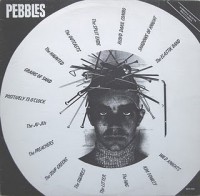
In 1972 Elektra Records’ Jac Holzman asked future Patti Smith Group guitarist and bassist Lenny Kay to compile what was a essentially a glorified mixed tape, resulting in Nuggets: Original Artyfacts of the First Psychedelic Era. This release became synonymous with the term “Garage Rock”, but this designation is not entirely accurate. Though rough and tumble staples like the 13th Floor Elevators and the Seeds are represented, more poppy-sounding bands like the Mojo Men, Sagittarius (featuring Glenn Campbell on vocals), and a host of other acts—some of whom were nowhere near a suburban garage when they cut these sides — are there too. Nuggets’ legacy is not so much its innovative (re)packaging of near hits, but its role in defining an aesthetic and its establishing of multiple genres and sub-genres: acid rock, power pop, sunshine pop, imitation Merseybeat, Dylan copycats, blue-eyed soul, even early Latino-rock — they’re all here along with more that send rock critics reaching for their thesauruses and record collectors scrambling for their paypal accounts. Perhaps neither Kaye nor Holzman knew the long-term ramifications of their Frankenstenian experiment. Indeed, the monster they created essentially spawned a whole industry, that of the Esoteric 60’s Music Compilation. It’s an industry that refuses to die, even almost 40 years later. Exploring this brave new world can be a daunting task. Here then is a quick guide to some logical starting points:
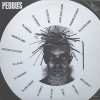 1. Pebbles – Conceived and created in Australia only a few years after the original Nuggets, this series focused on more raw and obscure (though not entirely unknown) acts from the US. Numerous volumes and offshoot series of widely varying quality proliferated through the 70’s and 80’s, but volumes 1-6 are pretty darn solid.
1. Pebbles – Conceived and created in Australia only a few years after the original Nuggets, this series focused on more raw and obscure (though not entirely unknown) acts from the US. Numerous volumes and offshoot series of widely varying quality proliferated through the 70’s and 80’s, but volumes 1-6 are pretty darn solid.
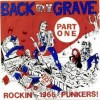 2. Back From The Grave – One of the few series worthy of the “60’s Garage Rock” classification, the US bands represented here are young, fast, raw, and sometimes very poorly recorded, which undoubtedly adds to its authenticity.
2. Back From The Grave – One of the few series worthy of the “60’s Garage Rock” classification, the US bands represented here are young, fast, raw, and sometimes very poorly recorded, which undoubtedly adds to its authenticity.
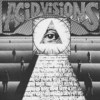 3. Acid Visions – Regional garage and psych compilations are very common. This one focuses on the Lone Star State, which produced a surprisingly diverse and consistently high quality array of sounds in the ’60s. The third and final volume focuses on female artists, a very underrepresented demographic in this male-dominated realm.
3. Acid Visions – Regional garage and psych compilations are very common. This one focuses on the Lone Star State, which produced a surprisingly diverse and consistently high quality array of sounds in the ’60s. The third and final volume focuses on female artists, a very underrepresented demographic in this male-dominated realm.
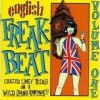 4. English Freakbeat – Since suburban two-car garages are not as common in England, perhaps it was inevitable that a moniker for similar music from the British Isles would be invented, and “Freakbeat” seems just as apt as any. Though the bands on these five LPs share many commonalities with their American garage brethren, a rawer and more purist blues sensibility often dominates.
4. English Freakbeat – Since suburban two-car garages are not as common in England, perhaps it was inevitable that a moniker for similar music from the British Isles would be invented, and “Freakbeat” seems just as apt as any. Though the bands on these five LPs share many commonalities with their American garage brethren, a rawer and more purist blues sensibility often dominates.
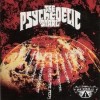 5. Rubble – While this Anglocentric series covers the Freakbeat sound like the series mentioned above, its emphasis is on the more cerebral and whimsical Psych-Pop of the late ’60s British and European scenes. Though spotty at times, many installments in this twenty volume series have numerous great tracks.
5. Rubble – While this Anglocentric series covers the Freakbeat sound like the series mentioned above, its emphasis is on the more cerebral and whimsical Psych-Pop of the late ’60s British and European scenes. Though spotty at times, many installments in this twenty volume series have numerous great tracks.
Further listening: One would think that by this point everything worthwhile has been unearthed, but the excavation continues. As unknown sides from the US and British scenes of the 60’s become scarcer, collectors are looking to more unexplored caches. Private pressings, underground Prog Rock, and Global Garage Rock have been the subject of many comps as of late. Cambodian Rocks delves into a thriving Asian scene that was tragically quashed when the Khmer Rouge took power. Love, Peace, and Poetry, a series still in progress, spans the globe to bring listeners impossibly rare pysch from the ’60s and ’70s. —Richard P
Are we forgetting your favorite series? Share your comments here:
Frank Zappa “Hot Rats” (1969)
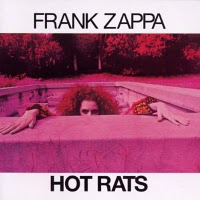 If there’s one thing I’m a sucker for, it’s psychedelic wah-wah guitar; Eddie Hazel’s Game, Dame & Guitar Thangs, Randy California’s Kapt. Kopter, John McLaughlin’s Devotion. And Frank Zappa’s second solo effort, 1969’s Hot Rats, proudly belongs among this stellar mind-blowing company. Somewhat of a break from the high-concept Mothers Of Invention, it’s divided between long guitar jams, most notably “Willie The Pimp,” which re-introduced Captain Beefheart to the world in all his eccentric splendor, and fusionoid instrumentals featuring multi-reedist Ian Underwood in multiple overdubs. Interestingly, Underwood’s flat intonation here takes intriguing lyrical compositions such as “Little Umbellas” and “It Must be A Camel” out of jazz wannabe Weather Report territory into a more formal “classical” direction, always the underlying goal with Zappa anyway. But, in the end, Rats is a showcase for Frank to wail and he ain’t fooling around! –Singersaints
If there’s one thing I’m a sucker for, it’s psychedelic wah-wah guitar; Eddie Hazel’s Game, Dame & Guitar Thangs, Randy California’s Kapt. Kopter, John McLaughlin’s Devotion. And Frank Zappa’s second solo effort, 1969’s Hot Rats, proudly belongs among this stellar mind-blowing company. Somewhat of a break from the high-concept Mothers Of Invention, it’s divided between long guitar jams, most notably “Willie The Pimp,” which re-introduced Captain Beefheart to the world in all his eccentric splendor, and fusionoid instrumentals featuring multi-reedist Ian Underwood in multiple overdubs. Interestingly, Underwood’s flat intonation here takes intriguing lyrical compositions such as “Little Umbellas” and “It Must be A Camel” out of jazz wannabe Weather Report territory into a more formal “classical” direction, always the underlying goal with Zappa anyway. But, in the end, Rats is a showcase for Frank to wail and he ain’t fooling around! –Singersaints
Camel “The Snow Goose” (1975)
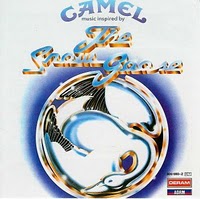 The Snow Goose is an essential experience, evocative and emotional, ambitious in it’s concept and execution, but accessible as well. The band manage to sustain an entirely instrumental album by filling it with brief, memorable pieces, carried by their always measured performances. While most of the album is devoted to the familiar Camel sound, they are joined in places by a small woodwinds group, expanding the scope of the music. Although you’ll want to leave the needle in place once you drop it, a few especially awesome moments are worth mentioning in particular, such as the multi-dimensional “Rhayader Goes To Town”, “The Snow Goose” which features some tender, spine-tingling guitar phrases, the duo of “Preparation”, with it’s foreboding sequencer pattern, and it’s haunting, slow-boiling partner in “Dunkirk”. But this is a complete, constantly unfolding album that should be heard with the lights down low, brew of choice in hand, the world of The Goose swooping into your listening room and filling the next 40 minutes with it’s sublime sounds. –Ben
The Snow Goose is an essential experience, evocative and emotional, ambitious in it’s concept and execution, but accessible as well. The band manage to sustain an entirely instrumental album by filling it with brief, memorable pieces, carried by their always measured performances. While most of the album is devoted to the familiar Camel sound, they are joined in places by a small woodwinds group, expanding the scope of the music. Although you’ll want to leave the needle in place once you drop it, a few especially awesome moments are worth mentioning in particular, such as the multi-dimensional “Rhayader Goes To Town”, “The Snow Goose” which features some tender, spine-tingling guitar phrases, the duo of “Preparation”, with it’s foreboding sequencer pattern, and it’s haunting, slow-boiling partner in “Dunkirk”. But this is a complete, constantly unfolding album that should be heard with the lights down low, brew of choice in hand, the world of The Goose swooping into your listening room and filling the next 40 minutes with it’s sublime sounds. –Ben
Bob Dylan “Blood On The Tracks” (1975)
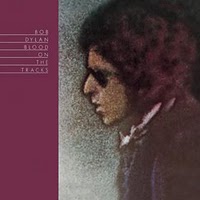 Quite simply, Blood On The Tracks is my favourite Dylan album. In one of those too few illuminating moments, I knew the first time I heard it that this was something special and through the years it has sustained me through some really bad times: divorce, depression and my Dad’s death. When written, Dylan himself was experiencing the traumas of a marriage break-up and all the muddled feelings that engenders are in evidence – sadness, bitterness, anger, relief and regret. But, even with this background, Blood On The Tracks is not a depressing album. “You’re Gonna Make Me Lonesome When You Go”, “If You See Her, Say Hello”, “You’re A Big Girl Now” and “Tangled Up In Blue” expose a man unsure of his feelings but striving to make a good fist of it. I could, and still can, identify with that. Even though his turbulent emotions must have been a dominating factor, Dylan also managed to pen a couple of wonderful morality tales: “Simple Twist Of Fate” and “Shelter From The Storm”, and a brilliantly inventive novella: “Lily, Rosemary And The Jack Of Hearts.” Blood On The Tracks will remain an album I will return to again and again. –Ian
Quite simply, Blood On The Tracks is my favourite Dylan album. In one of those too few illuminating moments, I knew the first time I heard it that this was something special and through the years it has sustained me through some really bad times: divorce, depression and my Dad’s death. When written, Dylan himself was experiencing the traumas of a marriage break-up and all the muddled feelings that engenders are in evidence – sadness, bitterness, anger, relief and regret. But, even with this background, Blood On The Tracks is not a depressing album. “You’re Gonna Make Me Lonesome When You Go”, “If You See Her, Say Hello”, “You’re A Big Girl Now” and “Tangled Up In Blue” expose a man unsure of his feelings but striving to make a good fist of it. I could, and still can, identify with that. Even though his turbulent emotions must have been a dominating factor, Dylan also managed to pen a couple of wonderful morality tales: “Simple Twist Of Fate” and “Shelter From The Storm”, and a brilliantly inventive novella: “Lily, Rosemary And The Jack Of Hearts.” Blood On The Tracks will remain an album I will return to again and again. –Ian
Buffalo Springfield “Buffalo Springfield Again” (1967)
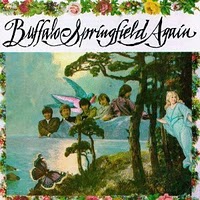 Just a little over 30 minutes long, and it goes in about as many directions. Neil Young’s songs don’t seem to belong on the same record as those of Stills or Furay; actually, they don’t seem to belong in the same universe. Yet the record as a whole doesn’t seem messy at all, but powerful, even focused, by its diversity. I used to love the Young songs — even the psychedelic weirdness of “Broken Arrow” — but these days I find myself attracted to the Stills songs, which are some of his best. “Bluebird” in particular manages to seem both sleek and cryptic at the same time, and the Stills-Young guitar team is a wonder (take that, Yardbirds!). Really, the only clunker is the Dewey Martin-sung “Good Time Boy”, a fairly terrible Otis parody (but at least it adds soul to the band’s armory). Everything else works, even “Mr Soul”, on which Neil borrows a riff from the Rolling Stones. And not for the last time, either. –Brad
Just a little over 30 minutes long, and it goes in about as many directions. Neil Young’s songs don’t seem to belong on the same record as those of Stills or Furay; actually, they don’t seem to belong in the same universe. Yet the record as a whole doesn’t seem messy at all, but powerful, even focused, by its diversity. I used to love the Young songs — even the psychedelic weirdness of “Broken Arrow” — but these days I find myself attracted to the Stills songs, which are some of his best. “Bluebird” in particular manages to seem both sleek and cryptic at the same time, and the Stills-Young guitar team is a wonder (take that, Yardbirds!). Really, the only clunker is the Dewey Martin-sung “Good Time Boy”, a fairly terrible Otis parody (but at least it adds soul to the band’s armory). Everything else works, even “Mr Soul”, on which Neil borrows a riff from the Rolling Stones. And not for the last time, either. –Brad
Jackson Browne “Late for the Sky” (1974)
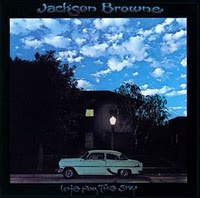 One of those artifacts that sort of sum up the 1970s for me, along with the films Annie Hall, Nashville and Three Women. Like those movies, Late for the Sky deals with the aftermath of a romance in dreamy, almost surreal style. If you’re looking for rock, look elsewhere; but if you lean to the Nick Drake/Tim Buckley end of the singer-songwriter spectrum and you’ve been put off by Browne’s reputation for cloying navel-gazing, then put your prejudices aside and listen to this record. –Brad
One of those artifacts that sort of sum up the 1970s for me, along with the films Annie Hall, Nashville and Three Women. Like those movies, Late for the Sky deals with the aftermath of a romance in dreamy, almost surreal style. If you’re looking for rock, look elsewhere; but if you lean to the Nick Drake/Tim Buckley end of the singer-songwriter spectrum and you’ve been put off by Browne’s reputation for cloying navel-gazing, then put your prejudices aside and listen to this record. –Brad
ZZ Top “Eliminator” (1983)
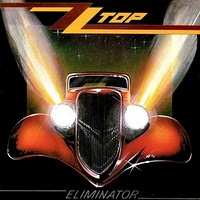 Whilst I admit to only having heard some of ZZ Top’s early albums, I fail to see how Eliminator could be considered a radical change in direction or why loyal fans should be so vociferous in their condemnation. Okay, the odd synthesiser has sneaked into the mix, the singles and videos were played to vomit-inducing levels on MTV and the band found themselves permeated into the mainstream, but is all that really worth getting your knee-length beard in a knot over? If compromises have been made, the result is a high-class exhibition of Texas boogie suffused with sex and booze and….T.V. Dinners. It was the album which put ZZ Top on my map and, if the band were in the business to make money, Eliminator was the licence for the band to print their own. The only downer I can think of was the videos were on such high rotation I eventually suffered from total burnout and had to hide the album away for fear of mental breakdown. Coming back to this today highlights how badly Eliminator has aged. There is no doubting which decade the album was released. Bill Ham has over-produced the album to such an extent that all blemishes and rough edges have been eradicated. The problem is, by doing so, he’s leeched away some of the individuality and quirkiness that made ZZ Top the bearded wonders they were. It’s the equivalent of a model’s face being airbrushed after a magazine photo-shoot only for the process to have been taken to extremes and all her facial features being wiped clean. That said, this is still an enjoyable album. “Gimme All Your Lovin'”, “Sharp Dressed Man”, “Got Me Under Pressure”, “I Got The Six”, “Dirty Dog” and “Bad Girl” bounce along with all the verve of a sweaty roadhouse on a Saturday night but “Legs” has become a victim of its own success; over-exposure has completely removed any enjoyment. Eliminator is no classic but it retains a sense of nostalgic charm that can’t be overlooked. –Ian
Whilst I admit to only having heard some of ZZ Top’s early albums, I fail to see how Eliminator could be considered a radical change in direction or why loyal fans should be so vociferous in their condemnation. Okay, the odd synthesiser has sneaked into the mix, the singles and videos were played to vomit-inducing levels on MTV and the band found themselves permeated into the mainstream, but is all that really worth getting your knee-length beard in a knot over? If compromises have been made, the result is a high-class exhibition of Texas boogie suffused with sex and booze and….T.V. Dinners. It was the album which put ZZ Top on my map and, if the band were in the business to make money, Eliminator was the licence for the band to print their own. The only downer I can think of was the videos were on such high rotation I eventually suffered from total burnout and had to hide the album away for fear of mental breakdown. Coming back to this today highlights how badly Eliminator has aged. There is no doubting which decade the album was released. Bill Ham has over-produced the album to such an extent that all blemishes and rough edges have been eradicated. The problem is, by doing so, he’s leeched away some of the individuality and quirkiness that made ZZ Top the bearded wonders they were. It’s the equivalent of a model’s face being airbrushed after a magazine photo-shoot only for the process to have been taken to extremes and all her facial features being wiped clean. That said, this is still an enjoyable album. “Gimme All Your Lovin'”, “Sharp Dressed Man”, “Got Me Under Pressure”, “I Got The Six”, “Dirty Dog” and “Bad Girl” bounce along with all the verve of a sweaty roadhouse on a Saturday night but “Legs” has become a victim of its own success; over-exposure has completely removed any enjoyment. Eliminator is no classic but it retains a sense of nostalgic charm that can’t be overlooked. –Ian
Captain Beefheart “Trout Mask Replica” (1969)
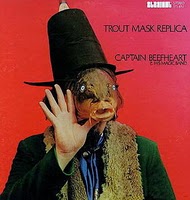 The Captain’s best known album really divides opinion. Some see it as utter unlistenable garbage others see it as some sort of musical nirvana. In truth it probably falls somewhere between the two extremes. It is indeed hard to listen too and it takes time to fully absorb the music. It is like the blues has crashed into an Albert Ayler gig and the two don’t make easy bedfellows. Still there is some incredibly complex and impressive playing contained within. The Rhythm section must have had nightmares when Beefheart turned up with the score, yes every note was written not improvised. Also if possible the lyrics seem even more out there than usual and reside firmly in the leftfield. The album does however contain two of my favourite Beefheart tracks in “Moonlight On Vermont” and “Dachau Blues.” –Jon
The Captain’s best known album really divides opinion. Some see it as utter unlistenable garbage others see it as some sort of musical nirvana. In truth it probably falls somewhere between the two extremes. It is indeed hard to listen too and it takes time to fully absorb the music. It is like the blues has crashed into an Albert Ayler gig and the two don’t make easy bedfellows. Still there is some incredibly complex and impressive playing contained within. The Rhythm section must have had nightmares when Beefheart turned up with the score, yes every note was written not improvised. Also if possible the lyrics seem even more out there than usual and reside firmly in the leftfield. The album does however contain two of my favourite Beefheart tracks in “Moonlight On Vermont” and “Dachau Blues.” –Jon
Badfinger “Wish You Were Here” (1974)
 Simply put Badfinger’s best album, contains no hit singles and was surprisingly pulled from the shelves (which can’t have helped Pete Ham’s fragile mind) but everything here has a cohesion and quality control lacking on other albums. ‘Just A Chance’ is a fabulous rocker, amongst the best of the band’s career, ‘You’re So Fine’, ‘Know One Knows’, ‘Love Time’, ‘King Of The Load’ could all quite conceivably been hit singles, all show the band’s poppier style to fine effect, ‘Got To Get Out Of Here’ and ‘Dennis’ show off a more acoustic, reflective almost countryish style whilst ‘In The Meantime/Some Other Time’ and ‘Meanwhile Back At The Ranch/Should I Smoke’ are pure power pop, lavishly arranged, musically and melodically as inventive as the band was ever to get, it lacks one of Ham’s gorgeous ballads but otherwise this is as good as they ever got, shame then that it was to be the band’s final album before Pete Ham’s suicide, they could have gone on to even better things. –Derek
Simply put Badfinger’s best album, contains no hit singles and was surprisingly pulled from the shelves (which can’t have helped Pete Ham’s fragile mind) but everything here has a cohesion and quality control lacking on other albums. ‘Just A Chance’ is a fabulous rocker, amongst the best of the band’s career, ‘You’re So Fine’, ‘Know One Knows’, ‘Love Time’, ‘King Of The Load’ could all quite conceivably been hit singles, all show the band’s poppier style to fine effect, ‘Got To Get Out Of Here’ and ‘Dennis’ show off a more acoustic, reflective almost countryish style whilst ‘In The Meantime/Some Other Time’ and ‘Meanwhile Back At The Ranch/Should I Smoke’ are pure power pop, lavishly arranged, musically and melodically as inventive as the band was ever to get, it lacks one of Ham’s gorgeous ballads but otherwise this is as good as they ever got, shame then that it was to be the band’s final album before Pete Ham’s suicide, they could have gone on to even better things. –Derek


